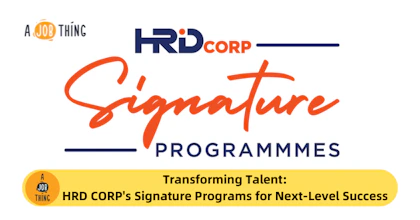Products
AI JOB AD
Create compelling job ads in seconds with AI-powered assistance.
AI JOB FOLDER
Automate your candidate screening and folder management.

CAREER PAGE
Build your personalized career page with strong company branding to attract candidates and manage your job vacancy.

AJOBTHING REVIEW
Explore what employers love about AJobThing recruitment platform for fast & successful hiring
AJOBTHING CARE
Get dedicated after-sales support, hiring guidance, and personalized assistance to ensure your recruitment success.
PARTNERSHIP
Collaborate with us to achieve mutual success and reach a wider audience.
Resources
Products
AI JOB AD
Create compelling job ads in seconds with AI-powered assistance.
AI JOB FOLDER
Automate your candidate screening and folder management.

CAREER PAGE
Build your personalized career page with strong company branding to attract candidates and manage your job vacancy.

AJOBTHING REVIEW
Explore what employers love about AJobThing recruitment platform for fast & successful hiring
AJOBTHING CARE
Get dedicated after-sales support, hiring guidance, and personalized assistance to ensure your recruitment success.
PARTNERSHIP
Collaborate with us to achieve mutual success and reach a wider audience.
- Select your industry

The Importance of Ethics and Integrity in Accountants
In finance, ethics and integrity are important for trust and credibility. They are foundational pillars for being a good steward. When choosing accountants, it is extremely important to hire people who always follow the highest ethical standards.
These individuals not only manage financial data but also safeguard the reputation and financial well-being of organisations. To ensure your team comprises ethical professionals, consider these guidelines for assessing candidates' ethical values and integrity during interviews.
Related: Accounting Industry: Financial Management and Beyond
The Importance of Ethics in Accounting
Ethics in accounting go beyond mere compliance with laws and regulations. It encompasses a commitment to honesty, transparency, and fairness in financial reporting and decision-making. Accountants must act in the best interests of their clients, employers, and the public as part of their duty. Ethical behavior guarantees truthful financial statements, helping investors, creditors, and stakeholders make informed choices about a company's finances.
An essential ethical principle of accounting is the concept of independence. Accountants must maintain an objective perspective, free from any undue influence that could compromise the accuracy and fairness of their assessments.
The Role of Integrity in Professional Standards
Integrity in the workplace forms the foundation of professionalism for accountants. It is about adhering to strong moral principles, even when no one is watching. This culture quickly finds and fixes possible breaches, stopping small ethical issues from becoming bigger problems that harm the company's reputation.
- The Cornerstone of Trust
Ethics and integrity form the bedrock of trust in the accounting profession. Candidates who prioritise these values demonstrate a commitment to fostering trust and transparency in financial operations.
- Real-World Scenarios
Pose hypothetical ethical dilemmas during interviews. Assess how candidates approach and resolve these situations, as their responses provide insights into their moral compass and decision-making process.
- Openness to Transparency
Ethical accountants embrace transparency. Inquire about candidates' willingness to report errors, disclose potential conflicts of interest, and share information truthfully.
- Alignment with Regulations
Probe candidates' knowledge of accounting regulations and ethical codes of conduct. Individuals well-versed in industry standards are more likely to uphold ethical practices.
- Values-Driven Decision Making
Discuss the values that guide candidates' decision-making processes. Ethical individuals are individuals who possess a strong sense of moral values and principles that guide their actions and decisions. These individuals prioritise honesty, fairness, and the best interests of stakeholders in all aspects of their lives.
- Accountability and Ownership
Ethical accountants take ownership of their work, even in challenging situations. Ask candidates how they handle mistakes and their approach to rectifying errors.
- Ethical Role Models
Inquire about candidates' professional role models. Ethical accountants often admire individuals known for their principled practices and ethical leadership.
- Ethical Leadership
Pose questions about candidates' experiences leading teams. The importance of ethical leadership is ethical leaders prioritising fairness, open communication, and adherence to rules and regulations.
- Ethical Dilemma Handling
Discuss instances when candidates faced ethical dilemmas in their career. Analyse their actions and the thought process behind their decisions to gauge their ethical fortitude.
- Commitment to Lifelong Learning
Ethical accountants understand the importance of staying updated with the latest developments and changes in the accounting field. Inquire about candidates' efforts to stay updated on evolving regulations and ethical best practices.

Safeguarding Professional Standards
Maintaining ethics and integrity at the forefront of the accounting profession requires intentional and consistent efforts. To ensure that these values remain paramount, consider implementing the following measures:
- Robust Ethics Training: Invest in comprehensive ethics training for both aspiring accountants and seasoned professionals. Accounting programs should include coursework on ethics and provide case studies to help future professionals navigate complex ethical situations.
- Code of Ethics: Professional organisations, such as the International Ethics Standards Board for Accountants (IESBA), create and update ethical codes for accountants to follow. These codes give clear rules for good behaviour. Accountants should be familiar with and adhere to these codes.
- Whistleblower Protection: Organisations should establish mechanisms that enable employees to report unethical behaviour without fear of retaliation. Whistleblower protection promotes a culture of accountability and transparency.
- Ethics Committees: Companies can create ethics committees comprised of representatives from various departments to review and address potential ethical concerns objectively.
- Continuing Professional Development: Accountants should engage in continuous learning to stay updated on changes in regulations and ethical standards. This helps them make informed decisions in evolving financial landscapes.
The Ripple Effect:
The impact of ethical conduct by accountants extends far beyond the realm of finance. Ethical behaviour enhances a company's reputation, attracting investors and partners who value transparency and trust. It creates a good work atmosphere where employees are proud to be part of an organisation with strong moral values.
Conclusion
Hiring accountants who value ethics and integrity is important for the financial health and reputation of organisations. By assessing candidates' ethical values during interviews, you build a team of professionals and protect the principles of the accounting profession. This creates an environment where ethical practices are the norm, promoting trust, transparency, and prosperity for everyone involved.
Try Instant Job Ad today and guarantee to hire your ideal retail staff within 72 hours!

Don't wait any longer to tap into A Job Thing's vast talent pool of 5 million active candidates. With our Instant Job Ad feature, you can kickstart the hiring process immediately and welcome right talent on board in no time. Get started now and secure your top retail talents within 72 hours!
Post Job Ads with AJobThing
Find best talents with 5+ million database on Maukerja, Ricebowl, Epicareer, LinkedIn, & Google!
Post Job Now
Recent Related Articles
- The Technician Industry: Powering Innovation and Precision
- Transforming Talent: HRD CORP's Signature Programs for Next-Level Success
- 10 ChatGPT Prompts for Recruiters
- What Can AI Do in Recruitment? A Guide for Employers
- Top 11 Job Skills Employers Look for in Candidates
Please be advised that A Job Thing provides information to assist our site users. However, we must emphasize that we are neither acting as your recruiter nor your legal advisor. We cannot be held liable for any inaccuracies in your job descriptions, and our information does not guarantee job performance.


